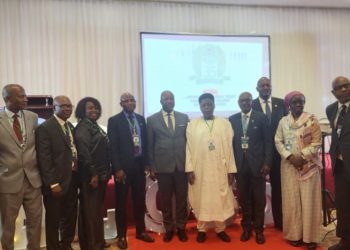By Nkechi Eze
…Commissioner Omosehin says new reform law will transform insurance into a driver of Nigeria’s economic resilience and national development
The National Insurance Commission (NAICOM) has called for the nationwide implementation and enforcement of the Nigerian Insurance Industry Reform Act (NIIRA) 2025, describing the landmark legislation as “a national asset, not just a law,” and a cornerstone for building a more inclusive, innovative, and resilient economy.
Speaking at the 2025 Stakeholders’ Retreat of the House Committee on Insurance and Actuarial Matters held in Maiduguri, Borno State, the Commissioner for Insurance, Mr. Olusegun Ayo Omosehin, said the new Act represents a transformative framework that integrates insurance directly into Nigeria’s national development agenda.
“Insurance is not just about premiums and claims,” Omosehin declared in his keynote address. “It is about protecting lives, preserving government resources, and building an economy that can withstand shocks.”
He explained that the NIIRA 2025 is designed to expand the reach and relevance of insurance across critical sectors, particularly agriculture, infrastructure, and public assets. Under the Act, NAICOM plans to promote index-based and parametric insurance for crops and livestock, encourage bundled insurance products linked with agricultural inputs and credit facilities, and establish collaborative platforms where insurers can partner with technology firms and agribusinesses to scale digital insurance delivery.
The Commissioner also revealed plans to work closely with state governments to embed insurance into agricultural extension services, ensuring that risk management becomes an integral part of Nigeria’s food security and rural development policies.
According to him, the theme of the retreat, “Navigating the New Era of Insurance Regulation,” reflects a collective commitment to building a modern, inclusive, and forward-looking insurance ecosystem. “NIIRA 2025 consolidates decades of fragmented legislation into a coherent framework that empowers regulators, protects consumers, and fosters innovation,” he stated.
Omosehin further noted that the retreat provided a timely platform to deepen stakeholders’ understanding of NIIRA 2025’s provisions and implications, strengthen collaboration between legislators, regulators, and industry players, and explore new strategic partnerships with state governments to provide adequate insurance cover for public assets, agriculture, and infrastructure projects.
Highlighting the role of insurance in agricultural transformation, the NAICOM boss disclosed that insurance coverage in the agricultural sector has already reached over 1.4 million smallholder farmers under NIRSAL’s agricultural insurance schemes, with a target of 3.6 million by 2026. In the second quarter of 2025 alone, he said, 250,000 farmers were insured across eight states under federal initiatives.
Citing data from North Central Nigeria, Omosehin observed that insured rice farmers recorded 11 percent higher productivity than their uninsured counterparts—averaging 20 bags per hectare compared to 18 bags per hectare. “This shows that insurance doesn’t just protect farmers—it empowers them to take calculated risks and invest in better inputs,” he explained.
The Commissioner also stressed that improved enforcement of insurance laws could significantly reduce emergency government expenditure and strengthen public confidence in the insurance industry. “Every year, billions are spent on roads, schools, and hospitals. Without insurance, one disaster can erase years of investment,” he cautioned, calling for greater accountability and compliance among government agencies and private operators.
Mr. Omosehin reaffirmed that NIIRA 2025 positions Nigeria’s insurance sector for sustainable growth, enhanced consumer protection, and global competitiveness. “This reform is not just for the industry—it is for Nigeria’s future. With full implementation, insurance will become a powerful instrument for fiscal stability, economic growth, and national resilience,” he concluded.

















